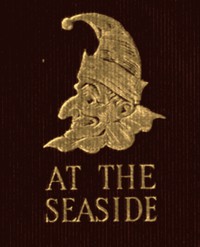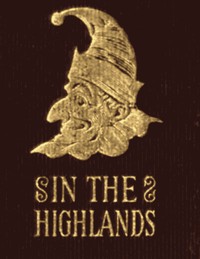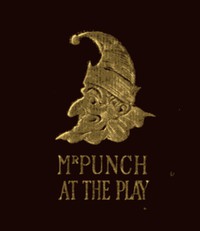Mr. Punch at the Seaside by J. A. Hammerton (classic children's novels .txt) 📗

- Author: J. A. Hammerton
Book online «Mr. Punch at the Seaside by J. A. Hammerton (classic children's novels .txt) 📗». Author J. A. Hammerton
[Pg 35]
[Pg 37]
[Pg 39]
Yachting Friend (playfully). "Have you any experience of squalls, Brown?"
Brown. "Squalls!" (Seriously.) "My dear sir, I've brought up ten in family!"
[Pg 40]
Wearied by London dissipation, the Marjoribanks Browns go, for the sake of perfect quiet, to that picturesque little watering-place, Shrimpington-super-Mare, where they trust that they will not meet a single soul they know.
Oddly enough, the Cholmondeley Joneses go to the same spot with the same purpose.
Now, these Joneses and Browns cordially detest each other in London, and are not even on speaking terms; yet such is the depressing effect of "perfect quiet" that, as soon as they meet at Shrimpington-super-Mare, they rush into each other's arms with a wild sense of relief!
[Pg 41]
Angelina (who has never seen a revolving light before). "How patient and persevering those sailors must be, Edwin! The wind has blown that light out six times since they first lit it, and they've lighted it again each time!"
[Pg 42]
[Pg 45]
"Now, mind, if any of those nasty people with cameras come near, you're to send them away!"
[Pg 46]
SEASIDE SOLITUDE Highburybarn-on-Sea(From our Special Commissioner)
Dear Mr. Punch,—This is a spot, which, according to your instructions, I reached last evening. In these same instructions you described it as "a growing place." I fancy it must be of the asparagus order, that vegetable, as you are well aware, taking three years in which to develop itself to perfection. Highburybarn-on-Sea is, I regret to say, in the first stage—judged from an asparagus point of view. I cannot entertain the enthusiastic description of the candid correspondent (I refer to the cutting forwarded by you from an eminent daily paper under the heading, "By the Golden Ocean.") He describes it as "an oasis on the desert coast of Great Britain."[Pg 48] Far be it from me to deny the desert—all I object to is the oasis.
I ask you, sir, if you ever, in the course of the travels in which you have out-rivalled Stanley, Cameron, Livingstone, Harry de Windt, and, may I add, De Rougemont, ever came across an oasis, consisting of two score villas, built with scarcely baked bricks, reposing on an arid waste amid a number of tumbled-down cottages, and surmounted by a mighty workhouse-like hotel looking down on a pre-Adamite beershop?
The sky was blue, the air was fresh, the waves had retreated to sea when I arrived in a jolting omnibus at Highburybarn-on-Sea, and deposited myself and luggage at the Metropolitan Hotel. A page-boy was playing airs on a Jew's-harp when I alighted on the sand-driven steps of the hostelry. He seemed surprised at my arrival, but in most respectful fashion placed his organ of minstrelsy in his jacket pocket, the while he conveyed my Gladstone[Pg 50] bag to my apartment, secured by an interview with an elderly dame, who gave an intelligent but very wan smile when I suggested dinner. She referred me to the head waiter. This functionary pointed in grandiose fashion to the coffee-room, wherein some artistic wall-papering wag had committed atrocities on which it would be libel to comment.
There was only one occupant, a short clean-shaven gentleman with white hair and a red nose, who was apparently chasing space. This turned out to be a militant blue-bottle. Meantime, the head-waiter produced his bill of fare, or rather the remains of it. Nearly every dish had apparently been consumed, for the most tempting plats were removed from the menu by a liberal application of red pencil. Finally, I decided on a fried sole and a steak. The white-haired man still pursued the blue-bottle.
I went up to my room, and after washing with no[Pg 52] soap I returned to the coffee-room. The blue-bottle still had the best of it. The head-waiter, after the lapse of an hour, informed me that the sole would not be long. When it arrived, I found that he spoke the truth. If you have any recollection of the repast which Porthos endured when entertained by Madame Coquenard, you will have some notion of my feast. The head-waiter told me that some bare-legged persons who had waded into the water were shrimp-catchers. I only wished that I were one of them, for at least they found food.
Later on I retired to rest. I was visited in the hours of darkness, to which I had consigned myself, by a horde of mosquitoes, imported, so I was informed in the morning, by American travellers, who never tipped the waiters. I fulfilled their obligations, still gazing on the auburn sand-drift, still looking on the sea, still feeling hungry and murmuring to myself, "Highburybarn-on-Sea would be a capital place for children, if I could only see any cows." A melancholy cocoa-nut shy by the station appeared to afford all the milk in the place.
Yours despondently,
Embarrassment of Riches: Margate.—Mother. "Now, Tommy, which would you rather do—have a donkey ride or watch father bathe?"
[Pg 47]
Master Tommy is emphatically of the opinion that the sexes ought not to bathe together.
[Pg 49]
[Pg 51]
Niece (after a header). "Oh, aunt, you're not coming in with your spectacles on?"
Aunt Clarissa (who is not used to bathe in the "open"). "My dear, I positively won't take off anything more, I'm determined!!"
[Pg 53]
Bathing Woman. "Master Franky wouldn't cry! No! Not he!—He'll come to his Martha, and bathe like a man!"
[Pg 54]
TO THE FIRST BATHING-MACHINE (After Wordsworth)O Blank new-comer! I have seen,
I see thee with a start:
So gentle looking a Machine,
Infernal one thou art!
When first the sun feels rather hot,
Or even rather warm,
From some dim, hibernating spot
Rolls forth thy clumsy form.
Perhaps thou babblest to the sea
Of sunshine and of flowers;
Thou bringest but a thought to me
Of such bad quarter hours.
I, grasping tightly, pale with fear,
Thy very narrow bench,
Thou, bounding on in wild career,
All shake, and jolt, and wrench.
Till comes an unexpected stop;
My forehead hits the door,
And I, with cataclysmic flop,
Lie on thy sandy floor.
Then, dressed in Nature's simplest style,
I, blushing, venture out;
And find the sea is still a mile
Away, or thereabout.
Blithe little children on the sand
Laugh out with childish glee;
Their nurses, sitting near at hand,
All giggling, stare at me.
Unnerved, unwashed, I rush again
Within thy tranquil shade,
And wait until the rising main
Shall banish child and maid.
Thy doors I dare not open now,
Thy windows give no view;
'Tis late; I will not bathe, I vow;
I dress myself anew.
[Pg 55]
General chorus (as the children's excursion nears its destination). "Oh, I say! There's the sea! 'Ooray!!"
Small boy. "I'll be in fust!"
[Pg 56]
HOW TO ENJOY A HOLIDAY A Social ContrastI.—The Wrong Way
Pater. Here at last! A nice reward for a long and tedious journey!
Mater. Well, you were always complaining in town.
Pater. Broken chairs, rickety table, and a hideous wall-paper!
Mater. Well, I didn't buy the chairs, make the table, or choose the wall-paper. Discontent is your strong point.
Pater. And is likely to remain so. Really, that German band is unbearable!
Mater. My dear, you have no ear for music. Why, you don't even care for my songs! You used to say you liked them once.
Pater. So I did—thirty years ago!
Mater. Before our marriage! And I have survived thirty years!
Pater. Eh? What do you mean by that, madam?
Mater. Anything you please. But come—dinner's ready.[Pg 58]
Pater. Dinner! The usual thing, I suppose—underdone fish and overdone meat!
Mater. Well, I see that you are determined to make the best of everything, my dear!
Pater. I am glad you think so, my darling!
[And so they sit down to dinner.
II.—The Right Way.Pater. Here at last! What a charming spot! A fitting sequel to a very pleasant journey!
Mater. And yet you are very fond of town!
Pater. This room reminds me of my own cozy study. Venerable chairs, a strange old table, and a quaintly-designed wall-paper.
Mater. Well, I think if I had had to furnish the house, I should have chosen the same things myself. But had they been ever so ugly, I feel sure that you would have liked them. You know, sir, that content is your strong point.
Pater. I am sure that I shall find no opportunity of getting any merit (after the fashion of Mark Tapley) for being contented in this pleasant spot. What a capital German band!
Mater. I don't believe that you understand[Pg 60] anything about music, sir. Why, you even pretend that you like my old songs!
Pater. And so I do. Every day I live I like them better and better. And yet I heard them for the first time thirty years ago!
Mater. When we were married! And so I have survived thirty years!
Pater. Eh? What do you mean by that, madam?
Mater. That I am a living proof that kindness never kills. How happy we have been! But come—dinner's ready.
Pater. Dinner! The usual thing, I suppose—a nice piece of fish and a juicy joint. Now, that's just what I like. So much better than our pretentious London dinners! Not that a London dinner is not very good in its proper place.
Mater. Well, I see that you are determined to make the best of everything, my dear.
Pater. I am glad you think so, my darling!
[And so they sit down to dinner.
[Pg 57]
Nursemaid. "Lawk! There goes Charley, and he's took his mar's parasol. What will missus say?"
[Pg 59]
Temperance Enthusiast. "Look at the beautiful lives our first parents led. Do you suppose they ever gave way to strong drink?"
The Reprobate. "I 'xpect Eve must 'a' done. She saw snakes!"
[Pg 61]
[Pg 62]
Sympathising Mr. Punch,
With the desire of enjoying a few days of tranquillity and a few dips in the sea, I have arrived and taken lodgings at this "salubrious watering-place" (as the guide-books choose to call it), having heard that it was quiet, and possessed of a steep, cleanly, and bathe-inviting beach. As to the latter point, I find that fame has not belied[Pg 63] it; but surely with a view to tempt me into suicide, some demon must have coupled the term "quiet" with this place. Quiet! Gracious Powers of Darkness! if this





Comments (0)